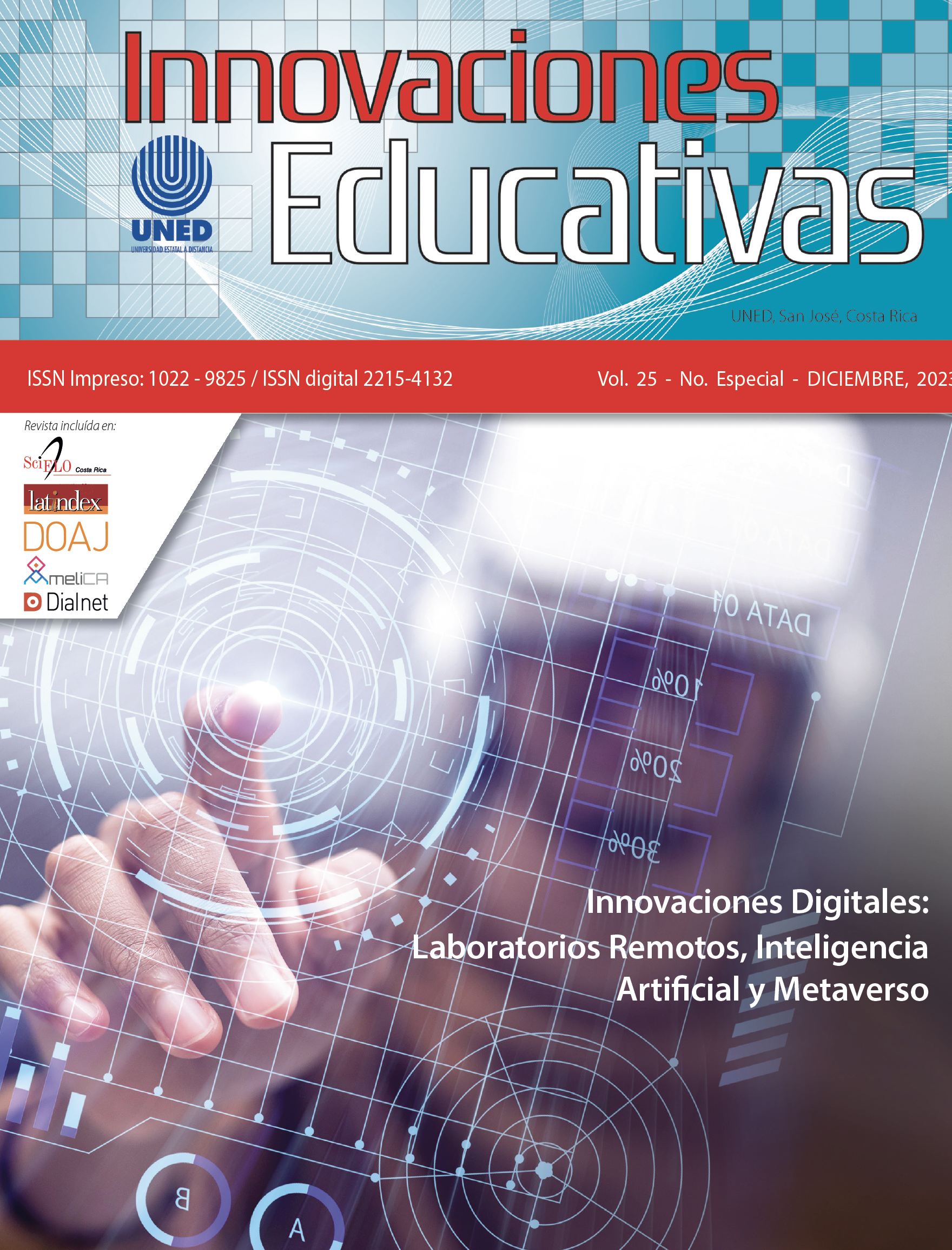The metaverse as a disruptive technology at the disposal of the teaching methodology in Higher Education Institutions
DOI:
https://doi.org/10.22458/ie.v25iEspecial.4819Keywords:
Metaverse, Blockchain, Higher Education, Advanced technology, Technological changeAbstract
The metaverse is an emerging technology that seeks to transform the way companies, institutions and people interact globally, but this initiative is in the process of consolidation and is gaining more followers every day due to its innovation. This technology is based on the evolution of the internet: from web 1.0 focused on hyperlinks, to web 2.0 that prioritizes social networks and now web 3.0 or internet 3.0, which focuses on data analysis to create a more intelligent and personalized web. Thus, through blockchain technology and NFTs, they have a close relationship with the metaverse, as they allow the creation, possession, control, and monetization of content in this digital environment. The metaverse is a virtual universe parallel to the physical one, accessible through virtual and augmented reality. This allows interaction in 3D environments through avatars, improving the current experience. Large companies are developing applications in education, economy, and society. Although its implementation in Higher Education Institutions faces limitations of knowledge, investment and resources, some prestigious universities are exploring its use. The metaverse can overcome geographical barriers, fostering synchronous global interaction. However, it raises concerns about mental health, with no specific studies that fully understand its effects. In summary, the metaverse is an emerging technology that promises to revolutionize virtual interactions. Companies and universities around the world are exploring it, presenting challenges, but also new possibilities in multiple fields, capable of transforming the way we live and work. The metaverse is a virtual universe parallel to the physical world, accessed through virtual and augmented reality devices. It allows interaction in 3D environments through avatars, enhancing the current virtual reality experience. Currently, major companies are developing applications in areas such as education, economy, planning, and society. However, the use of the metaverse in higher education institutions still faces limitations in terms of knowledge, investment, and necessary resources. Nevertheless, some prestigious universities are exploring its implementation.
It is important to mention that the metaverse has the potential to break geographical barriers and enable synchronous global interaction, but it also raises possible implications for people's mental health, despite the lack of specific studies to fully understand its effects. In conclusion, the metaverse is an emerging technology that promises to revolutionize how we interact in a virtual environment. It is being explored by major companies and universities worldwide, presenting challenges but offering new possibilities in various fields that can change the way we live and work.
References
Ball, M. (2022). El metaverso. Y cómo lo revolucionará todo. Ediciones DEUSTO.
Barráez, D. P. (2022). Metaversos en el Contexto de la Educación Virtual. Revista Tecnológica-Educativa Docentes 2.0, 13(1), 11-19.
Bit2me Academy. (2018, 4 de junio). ¿Qué es Bitcoin (BTC)?. https://academy.bit2me.com/que-es-bitcoin-btc-criptomoneda/
Bit2me Academy. (2021, 26 de noviembre). ¿Qué es el metaverso?. https://academy.bit2me.com/que-es-el-metaverso/
Binance Academy. (2022). La Historia de Blockchain. https://academy.binance.com/es/articles/history-of-blockchain
Botello, F. O., Sosa, C. D. L. C., y de Luna Caballero, R. (2021). Consideraciones pedagógicas y tecnológicas para la enseñanza y aprendizaje en línea en Educación Superior derivados de la pandemia por COVID-19. Revista Electrónica sobre Tecnología, Educación y Sociedad, 8(16).
Clegg, N. (2022). El metaverso abre nuevas oportunidades para América Latina. https://about.fb.com/ltam/news/2022/06/el-metaverso-abre-nuevas-oportunidades-para-america-latina/
Distrito Metaverso. (2023). Meta y VictoryXR crearán 10 universidades en el metaverso. https://distritoxr.com/meta-y-victoryxr-crearan-10-universidades-en-el-metaverso/
El mundo. (2022). Qué es el metaverso y cómo funciona. https://www.elmundo.es/como/2022/09/29/6335658ee4d4d8cf168b45ce.html
Fernández, Y. (2022). Qué es el Metaverso, qué posibilidades ofrece y cuándo será real. En Xataka Basics. https://www.xataka.com/basics/que-metaverso-que-posibilidades-ofrece-cuando-sera-real
Flores, A. (2023). El Metaverso en la educación. La escuela inmersiva. Revista Digital de ACTA. https://www.acta.es/medios/articulos/formacion_y_educacion/147001.pdf
Fundación Innovación Bankinter. (2022). Cuatro sectores que Web3 cambiará para siempre. https://www.fundacionbankinter.org/noticias/cuatro-sectores-que-web3-cambiara-para-siempre/?_adin=02021864894
Gonzales, Y. M., Napoleón, L., y Pérez, A. J. (2023). Metaverso y educación: un espacio complejo para la próxima revolución educacional. Metaverse Basic and Applied Research, 2 (56), 1-10.
Guana. J., Arteaga. Y.A., Chiluisa. M., y Begnini. L.F. (2022). Evolución de las Tecnologías de la Información y Comunicación en la Educación. En Third International Conference on Information Systems and Software Technologies (ICI2ST). https://www-scopus-com.cidreb.uned.ac.cr/record/display.uri?eid=2-s2.0-85151394248&origin=resultslist&sort=plfdt-f&listId=myDocList&listTypeValue=Docs&src=s&imp=t&sid=233eb46cbf6045403916cd7adad095ef&sot=ml&sdt=ml&sl=0&relpos=0&citeCnt=0&searchTerm=
Lenis, A. (2022). Metaverse: qué es el Metaverso, cómo funciona y para qué sirve. HubSpot. https://blog.hubspot.es/marketing/que-es-metaverse
López-Belmonte, J., Pozo-Sánchez, S., Moreno-Guerrero, A.J., y Lampropoulos, G. (2023). Metaverse in education: a systematic review. Revista de Educación a Distancia (RED), 23(73), 1-25. https://doi.org/10.6018/red.511421
Martínez, M. (2023). ¿Cómo podría afectar el metaverso a nuestra salud mental? bloglenovo. https://www.bloglenovo.es/metaverso-salud-mental/
Monzón, N. S., Almeida, R. R., Gálvez, S. A. H. y Labra, D. (2022). Salud mental y usos de la tecnología en el contexto universitario. Una revisión de la literatura. Publicaciones: Facultad de Educación y Humanidades del Campus de Melilla, 52(3), 191-228.
Plain Concepts. (2022). Web 3.0: La nueva revolución de Internet. https://www.plainconcepts.com/es/que-es-web-3/
PlayGround. (2018, 30 de marzo). Qué es "Blockchain" en 5 minutos [video]. YouTube. https://www.youtube.com/watch?v=Yn8WGaO__ak&t=10s
Roca, C. (2023). ¿Qué es la blockchain? Descubre la revolución que plantea la cadena de bloques. https://www.thepowermba.com/es/blog/que-es-la-blockchain
Sáez, J. (2022). Qué es Blockchain y cómo funciona la tecnología Blockchain. https://www.iebschool.com/blog/blockchain-cadena-bloques-revoluciona-sector-financiero-finanzas/
Sandoval, A. M. y Tabash, F. (2021). Realidad virtual como apoyo innovador en la educación a distancia. Revista Innovaciones Educativa, 23(Número Especia), 120-132.
VictoryXR. (2021a, 1 de diciembre). Experience Your College Campus in VR - VictoryXR Can Build Your Digital Twin Metaversity [Video]. YouTube. https://www.youtube.com/watch?v=7BzO_o3wcZw&t=4s
VictoryXR. (2021b, 3 de agosto). Fisk University's 5G-Powered VR Cadaver Lab In Collaboration with VictoryXR, HTC Vive & T-Mobile [Video]. YouTube. https://www.youtube.com/watch?v=VF6BhJDeWtg&t=1s
Downloads
Published
How to Cite
Issue
Section
License
Copyright (c) 2023 Innovaciones Educativas

This work is licensed under a Creative Commons Attribution-NonCommercial-NoDerivatives 4.0 International License.

